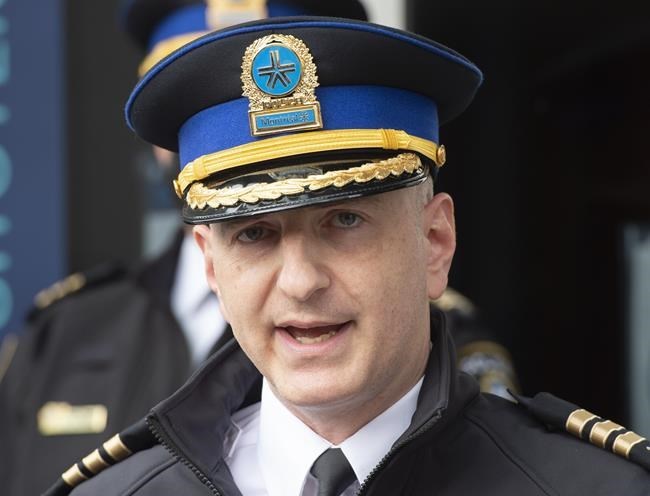Montreal police officers are trained to be alert for danger, but after two officers were allegedly targeted by bullets earlier this week, members of the force are being urged to be extra careful, Insp. David Shane said Wednesday.
"Though that is part of their training — to be in that state of mind when they work — obviously following the events we're asking them to increase their vigilance, all while maintaining an excellent relationship with the Montreal community," he said in an interview.
Montreal police Chief Sylvain Caron told reporters Tuesday night two officers were targeted in a shooting earlier that morning as they exited the McGill University Health Centre in the city's southwest. Officers took cover behind their vehicle and one suffered a slight arm injury in the course of the incident, Caron added. Two bullet holes and a projectile were found at the scene.
Shane said that while officers are accustomed to occasionally confronting violent or aggressive behaviour, the police are concerned with the "gratuitous" nature of Tuesday's incident.
"We want to condemn this act, because it's unacceptable in our society," he said. "You can't attack employees or symbols of our justice system, and particularly police officers."Â
Caron was scheduled to meet Wednesday with the two officers involved in the shooting to ensure they are receiving proper support, Shane said, adding that other members of the force are encouraged to reach out for help if they feel affected by what happened.
Wednesday morning, another Montreal police officer, Jean-Pierre Brabant, said investigators had completed their sweep of the scene but were still gathering evidence, including video surveillance. As of Wednesday afternoon, no motive or suspect had been identified.
Brabant said police were also investigating after a bullet hole and casings were found at another scene a few blocks from the hospital. It was unclear when those shots were fired, he said, but ballistics analysis would be needed to determine if there was any link between the scenes.
Shane said police are "a big family" and they appreciate any shows of support from the public, adding that investigators are asking anyone with information about Tuesday's shooting to come forward.
The incidents come as officials in Montreal have been sounding the alarm about a spate of high-profile shooting incidents in the city.
Earlier this month, the Quebec government announced a new unit composed of Montreal city police and provincial police to reduce gun trafficking and address what they described as a rising number of shootings in the province's largest city.
The headlines have also prompted Montreal Mayor Valérie Plante on Tuesday to repeat her calls for federal leaders to take stronger action to stop the flow of guns into Canada and to ban automatic weapons and handguns.
Shane said gun violence is something police forces in all major cities are dealing with. He said the rise in gun crime in the city is due to a "number of different factors," including criminal gang rivalries, but he warned it's too soon to say whether the shots fired at the officers could be linked to other recent shootings in the Montreal area.Â
Ted Rutland, professor at Concordia University's geography, planning and environment department, warns against trying to fit Tuesday's incident into a narrative about rising gun violence.
"I would caution against coming to conclusions until we understand better what happened," Rutland, who researches policing, said in an interview Wednesday. "You know, if we care about people who are harmed by gun violence, whether they're police or community members, we need to understand why they occurred."
Rutland said the numbers provided by Montreal police do not support the notion that there's a growing firearms crisis in the city. The number of crimes involving firearms in the city actually declined by 20 per cent from 2018 to 2020, he said.
Data from January to July of 2021 provided by the police show 262 reports of crimes against persons involving guns, compared to 224 the year before — an increase, but one Rutland said is not enough to draw a firm conclusion, especially given the wide nature of the category.Â
Rutland said the perception of a crisis can lead officials to make hasty announcements in the name of quick action, which inevitably lead to more police powers and "short-sighted" blitzes rather than longer-term interventions that address the roots of violence.
Rather, he said, it's important to listen to the needs of community organizations that are best positioned to work with marginalized youth, who are most at danger of being swept up into gun violence.
This report by The Canadian Press was first published Aug. 25, 2021.
Morgan Lowrie, The Canadian Press

